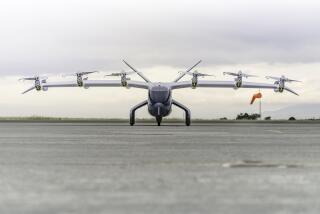Port District Raises Control Over Airport Taxis in Effort to Curb Gripes, Congestion
- Share via
Seeking to end complaints about ill-mannered, sloppily dressed cabbies who drive run-down vehicles to pick up fares at Lindbergh Field, the San Diego Unified Port District passed an ordinance Tuesday sharply increasing the agency’s regulation of taxis.
Under the new ordinance, the Port District will inspect cabs, test drivers and reduce the number of taxis--from 225 to 150--which vie daily for the lucrative airport fares.
At the meeting, Floyd Morrow, representing the San Diego International Airport Taxi Assn., criticized the Port District for “delving into police powers for the first time” that were normally exercised by the city, and said the new rules would duplicate tests and inspections already administered by San Diego.
Commissioner Louis Wolfsheimer said the new ordinance would have been unnecessary if the city wasn’t “doing a damn crappy job” of regulating taxis.
Wolfsheimer, who as a commissioner represents the city, noted that, if city regulators did a better job, cabs would not “run around the city in the dreadful condition they are. We can do a damn sight better job” of regulation, he said.
Airport cabbies say the new regulation cuts the number of days they can work at Lindbergh Field to one in three instead of every other day, as they do now.
“Working every third day would jeopardize people’s living,” said cabbie Tom Karpecki. “A lot of people won’t be able to make their lease” payment to the cab company.
While waiting in line for a fare on Tuesday, driver Jani Huydar disputed claims that taxi drivers are not well-groomed. “We’re not dirty,” he said, waving his arm at several cabbies who had gathered around. “Look here. Do you see anybody dirty?”
The new regulation provides a dress code. Men must wear shirts with collars, trousers and shoes. Women must wear a dress; a skirt, trousers or slacks and a shirt or blouse with a collar, and shoes.
T-shirts, tank tops, body shirts, shorts, swimming suits, jogging suits and sandals are banned.
The commissioners twice amended the ordinance Tuesday to benefit cabbies. When the discussion revealed that taxi owners often buy used, low-mileage cars, the commissioners raised the maximum permitted age of a taxi from five to seven years and allowed drivers who apply for a $25 permit when less than six months remain in the calendar year to pay only $12.50. The seven-year car age limit will not go into effect until Jan. 1, 1989.
Before obtaining the permit, drivers must demonstrate a knowledge of San Diego neighborhoods and significant sites. They must also show that they understand English and can respond to directions.
The commissioners surprised industry officials by changing the draft ordinance to prohibit the transfer of permits. “If you have a business and sell it, you have the right to sell the good will of the business,” said Jose Antonio Hueso, a co-owner of USA Cab Co. “They’re saying you can’t sell that.”
Under the new rules, the Port District will continue to issue 450 permits to operate taxis at the airport. The ordinance, which goes into effect 31 days after it is published later this week, will allow only a third of those to pick up fares on a given day.
With as many as 225 drivers a day at the airport, cabbies currently wait one to two hours in line before they get to the front of the terminal. By the time they get there, visitors have said, some are irritable and refuse to take short-distance fares.
The ordinance attempts to cut down the wait by reducing the number of operators allowed each day.
The issue is complicated because there are only 63 taxi waiting spaces at the airport. Cabbies either park illegally or drive slowly around the terminals, waiting for a chance to get into a line. On holidays, such actions contribute to the airport’s huge traffic jams.
To help alleviate the taxi parking problem, the Port District is studying the possibility of providing cab waiting areas in the vicinity of the airport.
Port officials said the new rules will provide some flexibility to allow additional cab service at the airport, especially on busy days such as for the Super Bowl next year, when thousands will descend on San Diego for the annual football classic.
More to Read
Sign up for Essential California
The most important California stories and recommendations in your inbox every morning.
You may occasionally receive promotional content from the Los Angeles Times.













